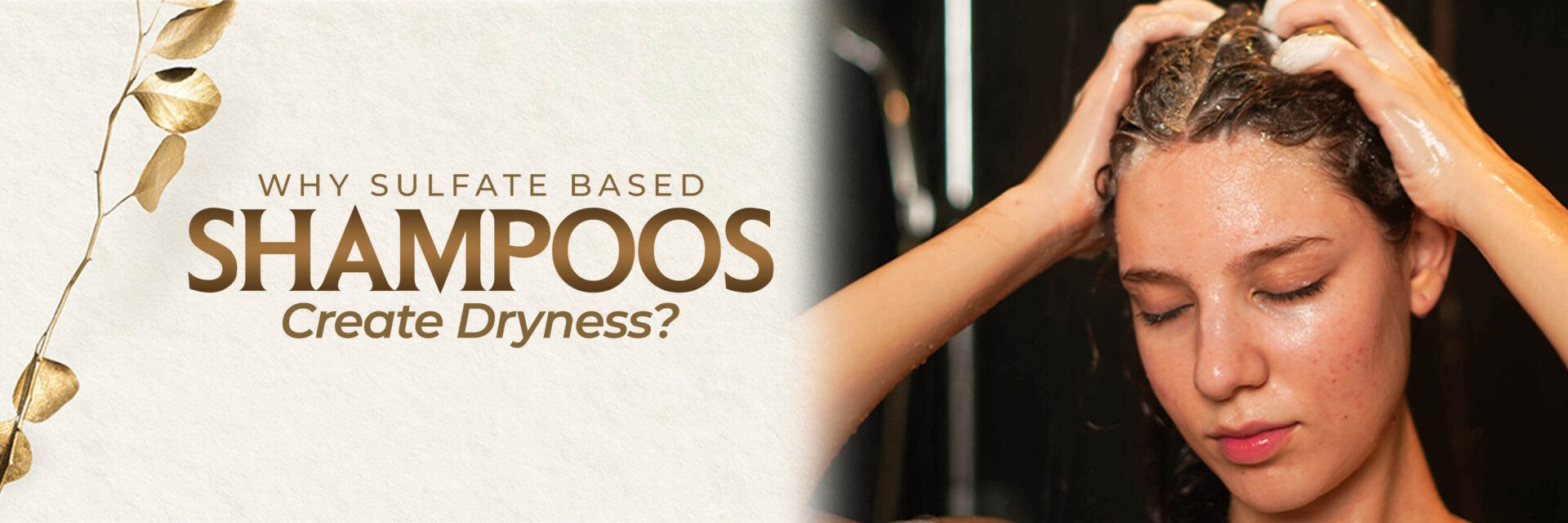
Sulfates are chemicals found in many products like shampoos, toothpaste, and foaming cleansers. They help create that bubbly foam we see when we mix shampoo with water. While sulfates are usually safe for most people when used correctly, some might have sensitivities to them. This can lead to dryness in hair and skin. If you want to learn more about sulfates, why sulfate-based shampoos can cause dryness, and who should skip these products, keep reading!
What are Sulfates?
Sulfates are chemicals that help shampoos work better. They are a type of surfactant, which means they lower the surface tension of liquids, making it easier for shampoo to mix with water and create foam.
The two main sulfates in shampoos are sodium lauryl sulfate and sodium laureth sulfate. They make the shampoo lather up, which helps wash away oil and dirt from your hair. If your shampoo bubbles up a lot in the shower, it probably has sulfates in it. On the other hand, sulfate- shampoos don’t create much foam.
When shampoo foams, it spreads easily across your scalp. This can help the good ingredients in the shampoo clean your hair more effectively and remove dirt and extra oil. Plus, it might mean you can use less shampoo overall.
Common sulfates in store-bought shampoos include sodium lauryl sulfate, sodium laureth sulfate, and ammonium laureth sulfate. Some products might have similar compounds that aren’t true sulfates but still do the same job.
Compared to other cleansing ingredients, sulfates are known for being really effective at cleaning. They are part of a group of cleansers called anionic surfactants, which help remove grime. However, french haircare products often have natural ingredients.
Even though sulfates are popular in shampoos, there has been some debate about them over the years. Some people think sulfates could be harmful to health, especially since we use shampoo so often. In the past, some believed sulfates might cause cancer, but more recent studies have shown that isn’t true.
Are Sulfates Dangerous?
Sulfates in shampoo can have some downsides. One issue is that they clean hair too well. Sulfates help shampoo remove oil and dirt, but your hair needs to keep some of its natural moisture and oils to stay healthy. If sulfates take away too much moisture, your hair can become dry and unhealthy. They can also make your scalp dry and irritated.
Other than the potential drying effect, using sulfates correctly isn’t very risky for your health. A review in Environmental Health Insights looked into the safety of sodium lauryl sulfate. The researchers found that many people’s negative views about sulfates might come from misunderstandings of scientific studies.
A common myth is that sulfates can cause cancer, but there’s no scientific proof that supports this or any other health risks from sulfates. Sodium lauryl sulfate can cause minor issues like eye irritation, skin irritation, or toxicity if someone drinks it. However, most people don’t experience any side effects when using products with sulfates.
Who Should Avoid Sulfates?
Most people can use shampoos with sulfates without any problems. In fact, those with really greasy hair or dandruff often find that sulfate shampoos clean their hair the best. However, some people should skip sulfates and go for sulfate-free shampoos. Here’s who should avoid them:
People with sensitive skin or scalp
If someone has sensitive skin or a scalp, sulfates can dry out their hair and skin. For those with conditions like eczema or psoriasis, using sulfate shampoos might lead to itching, redness, and cracks on their scalp. They should think about using sulfate-free options instead.
People with dry, frizzy hair
If your hair is naturally dry, curly, or frizzy, sulfates can make it even drier and more frizzy. This happens because sulfates strip away natural oils and moisture, causing more friction. Using DNA shampoo and conditioner can greatly improve your hair’s health.
People with dyed or chemically treated hair
If someone colors their hair or frequently straightens or curls it, sulfates can cause more damage. To keep hair healthy, it’s best to avoid anything that adds more stress or dryness. Plus, sulfate shampoos can wash out hair color faster, which is a bummer for anyone who dyes their hair.
Sulfate-Free Shampoo
If you have sensitive skin and hair and find that sulfate shampoos cause problems, you might want to try sulfate-free shampoos to see if they help.
There are many sulfate-free options out there, but remember that some still have chemicals similar to sulfates. If your skin and hair are very sensitive, look for the most natural and truly sulfate-free products to avoid any issues.
Sulfate-free shampoos might feel different at first. They might take longer to foam up, and you might need to use more shampoo to get your hair clean. You may also need extra water to rinse them out completely.
At French DNA, we believe everyone has their own beauty, and we want to help you show it off with great hair and skin care. We know our customers have unique needs, so we focus on creating products that really work. Our sulfate-free shampoos can clean your hair as well as regular shampoos with sulfates.
FAQs
Does sulfate shampoo cause dry hair?
If your hair is really dry or if it’s coarse and curly, it’s better to avoid shampoos with sulfates. Sulfates can take away the natural oils and moisture in your hair, which can make it frizzy.
Why does sulfate-free shampoo make my hair feel like straw?
Some sulfate-free shampoos add ingredients called emollients to make them feel less harsh. For some hair types, this works fine, but for more delicate hair, these can still make it feel dry and brittle.
Why are sulfates in shampoo bad for you?
Sulfates can wash away the natural oils from your hair and scalp, which can make your hair dry, cause irritation, and even damage it.
Does sulfate cause dry skin?
Yes, sulfates like SLS and SLES can remove too much oil from your skin. This can wash away the skin’s protective barrier, leading to redness and dry, itchy skin.
Conclusion
In general, sulfates in shampoos are safe. They help remove dirt and oil from your hair. However, if you have sensitive hair or skin, sulfate shampoos might cause some problems, like dry or brittle hair and a dry or red scalp. If you notice these issues, you might want to try a sulfate-free shampoo to see if it helps. If you’re unsure about your symptoms or how a product affects you, it’s a good idea to talk to a doctor or dermatologist. Lastly, if you’re looking to buy DNA hair products, consider our products.

